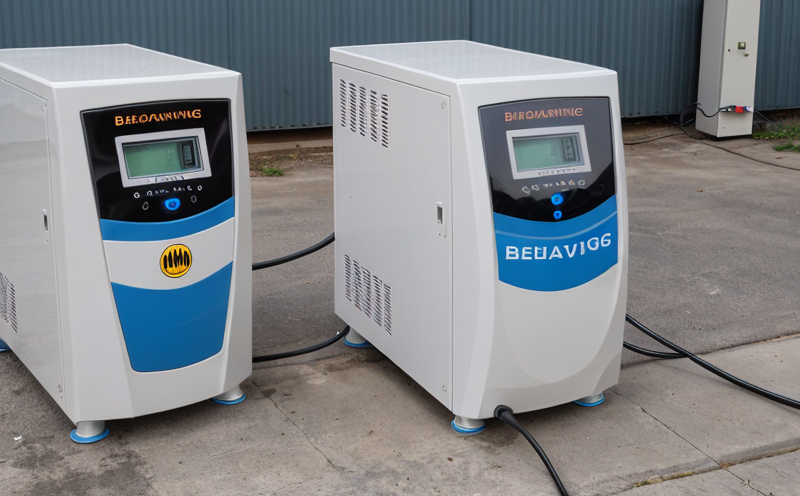IEC 61982-1 Charging and Discharging Behavior Testing of Rechargeable Batteries for Electric Vehicles
The IEC (International Electrotechnical Commission) standard IEC 61982-1 is a crucial document that outlines the methods to test the charging and discharging behavior of rechargeable batteries used in electric vehicles (EVs). This testing ensures that EV batteries meet stringent performance, safety, and reliability requirements. The primary goal of this standard is to provide detailed guidance on how to conduct these tests, which are essential for ensuring that battery systems operate efficiently under a wide range of conditions.
The charging behavior tests included in IEC 61982-1 cover the performance of batteries during various charging scenarios. These include constant current charging, constant voltage charging, and trickle charging. The discharging behavior tests evaluate how well the battery can deliver power under different discharge rates and temperatures. This comprehensive approach ensures that EV manufacturers have a robust set of data to assess their product's durability and efficiency.
One of the key aspects of this standard is its focus on real-world scenarios, which helps in predicting the lifespan and performance of an EV battery over time. By simulating different charging and discharging conditions, manufacturers can identify potential issues early in the development process. This not only improves product quality but also enhances consumer trust.
The testing procedures outlined in IEC 61982-1 are designed to be both rigorous and adaptable, allowing for modifications based on specific battery types and vehicle models. The standard covers a wide range of applications, from small-scale prototypes to mass-produced vehicles. This adaptability ensures that the tests remain relevant as technology advances.
The standard also emphasizes the importance of accurate measurement techniques. Precise data collection is crucial for validating test results and ensuring consistency across different manufacturers and testing facilities. This precision helps in reducing variability in test outcomes, which is essential for maintaining high standards of quality and reliability.
In addition to its technical aspects, IEC 61982-1 also addresses the safety considerations associated with EV batteries. The standard includes detailed guidelines on how to safely handle and test these batteries during charging and discharging processes. These safety protocols are critical for preventing accidents and ensuring that EVs can be used safely in various environments.
The results of IEC 61982-1 testing provide valuable insights into the performance, reliability, and safety of EV batteries. This information is invaluable to quality managers, compliance officers, R&D engineers, and procurement professionals involved in the development and production of electric vehicles. By adhering to these standards, manufacturers can ensure that their products meet international quality benchmarks.
| Standard Name | Edition | Year Published |
|---|---|---|
| IEC 61982-1 | Ed. 2.0 | 2015 |
Applied Standards
The IEC standard, IEC 61982-1, is the primary document used for testing charging and discharging behavior of rechargeable batteries in electric vehicles. This edition (Ed. 2.0) was published in 2015 and provides detailed guidelines on how to conduct these tests. The standard ensures that all aspects of battery performance are thoroughly evaluated under various conditions, including different charging rates, temperatures, and discharge patterns.
| Standard Name | Edition | Year Published |
|---|---|---|
| IEC 61982-1 | Ed. 2.0 | 2015 |
Customer Impact and Satisfaction
The tests conducted according to IEC 61982-1 have a direct impact on the performance, reliability, and safety of electric vehicles. By ensuring that batteries meet the stringent requirements set by this standard, manufacturers can provide consumers with products that are dependable and safe for long-term use. This enhances customer satisfaction and trust in the brand.
Quality managers benefit from having access to detailed test data, which allows them to make informed decisions about quality control processes. Compliance officers ensure that all manufacturing practices adhere to international standards, thereby avoiding potential legal issues and maintaining a good reputation in the market. R&D engineers gain valuable insights into improving battery performance through rigorous testing.
For procurement professionals, the adherence to IEC 61982-1 ensures that they are sourcing high-quality components from reliable suppliers. This not only reduces the risk of substandard parts but also streamlines supply chain management and reduces costs associated with rework or product recalls.
Environmental and Sustainability Contributions
- Reduces waste by ensuring that batteries are designed for longevity and efficient recycling.
- Promotes the use of renewable energy sources, as electric vehicles contribute to reducing carbon emissions.
- Encourages the development of sustainable manufacturing processes by focusing on efficiency and minimal environmental impact.





